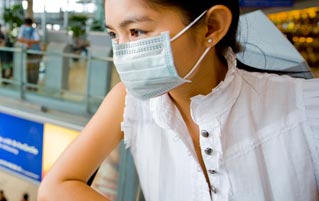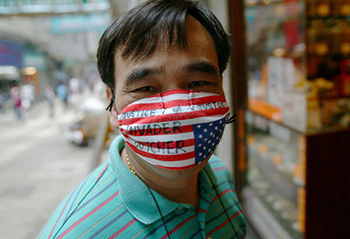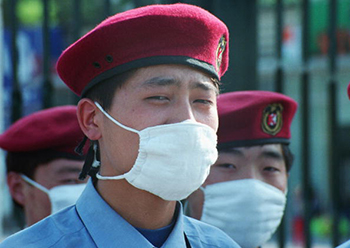6 Ways Life Gets Complicated When Disease Overruns Your Town

If you've been feeling like the end times are upon us, take heart: There are some portents we have to see before the real apocalypse kicks off. Rivers of blood, dude on a white horse, plagues -- we only have, tops, two of those right now. There just aren't many sexy plagues making the rounds these days. But back in 2002, SARS appeared in China and the world went nuts. By the time that epidemic was done, the disease had spread to 73 countries and killed nearly 800 people. We talked to Tyler, a kid living literally down the street from where the disease first popped up. The way he recalls it ...
Suddenly, Everywhere You Look, There Are Masks
One day, when I was six, I saw the grocery clerk wearing a mask. I was terrified.

If you think of Asian Urban Face Fashion, your mind goes to those photos of people wearing hospital-style masks over their noses and mouths. But those are usually in industrial cities like Beijing, with their coal-burning plants and traffic pollution, or Japan, with their cultural hygiene concerns. There was nothing like that in the southern Chinese city of Guangzhou, where I lived as a child. Guangzhou is a tropical city with big blue skies and mostly fresh air. It's about as clean as you'll find in a city of 16 million people. In 2002, it became the epicenter of the SARS epidemic.
Out came the masks. I still remember my fear and bewilderment at those blue facehuggers. These were different from the flimsy paper ones folks in Beijing wear to block the smog. We turned to eight-ply surgical masks, which guard against minuscule airborne droplets of contaminated saliva. They were thick and hot, and when they got soaked with sweat they became suffocating. Talking was difficult, but we kept them on all the time (and doctors wore two), because this new disease going around was deadly and very, very contagious.




We Were Wracked With Paranoia
A couple of years ago, the U.S. went apeshit over Ebola (and it only killed two Americans). Ebola sounds like a plague wrought in vengeance by a primeval deity, but you only catch it if your fluids come into contact with infected fluids, which is as gross as it is unlikely in the First World. Scary as Ebola was (and there were later reported Ebola cases in my city), the question "Did my fluids come in contact with some guy's from Liberia?" didn't exactly haunt the populace.
But SARS was the perfect disease for the 21st century (even the name sounds trendy). Since it was spread by airborne pathogens, it could be caught at any time, carried by any one. SARS started killing hundreds of people and infecting thousands more. A few of these people hopped on planes and started coughing their way across the world, like an Indiana Jones travel montage, but with more fatal respiratory failure.

China was also the perfect incubator. The crush of crowds and public transport ramped up paranoia like you wouldn't believe. Everyone knew they could catch SARS at any time.
Were you in the same bus as an infected person? Did they sneeze near you? Did you inhale the virus at the market? Did you talk to someone without a mask? Are your hands contaminated with the germs, and did you pass it on to your baby? Did you touch the door handle that an infected did? Should you get that cough checked out? If you went for a checkup at the hospital, would that get you sicker? We were more paranoid than your average late-night Taco Bell customer.

We Thought It Was A Biological Weapon
As crazy as it sounds now, at first we thought we'd been attacked ... by the United States of America ... using a biological weapon. That's madness, I know, but that was the rumor going around at the time. To us, the United States was China's greatest economic rival, and it had been attacked by terrorists the previous year. It was already waging war in Afghanistan (which shares a small border with China), so why not China itself next?

And then came this freaky contagious epidemic, perfectly tailored to crowded, world-travelling southern Chinese. Surely it was cooked up in a vial by U.S. scientists, right next to the super-soldier serum, and Manthrax (the more macho version of anthrax).
We Got Our News From The Rumor Mill
Even when SARS started ratcheting up over a hundred deaths, the government's official stance was "Chillax, bros!" They said that only a dozen or so had died, and SARS really wasn't an issue. This lie likely led to additional deaths, and it was only revealed when a Chinese doctor leaked the truth to the international public. So we didn't listen to the government, and instead got our news through snippets of anonymous chain messages circulated endlessly between friends.
Weeks before the news had anything to say about SARS, we got texts informing us that a deadly lung disease was catching on at the Third Affiliated Hospital of Sun Yat-Sen. (Hospital Zero was a short walk from my family's house.) The texts said that doctors and nurses were dropping like dissidents, and that in ward after ward, people's lungs were turning black and rotten.

These texts also offered advice. Some of it was surprisingly sensible. Some of it was exactly what you'd expect from unverified chain texts.
Our Countermeasures Were As Crazy As They Were Ineffective
SARS had no scientific cure known to the medical community. Fortunately, informed by texts and popular Chinese medical wisdom, everybody could, and did, fight SARS like medieval apothecaries. Turns out boiling vinegar was the answer, because the steam would cleanse the air of SARS-carrying droplets. Obviously!
My kindergarten boiled huge vats of vinegar constantly -- no parent would send their kids to a school that didn't -- and the sour reek was in everyone's houses and clothes. People washed their windows in vinegar. For several months, there was no vinegar in any of our cooking, because it was only to be used as medicine. The price of vinegar rose 3,000 percent, and it disappeared off of all the shelves. The end result? Now everything smelled like vinegar and we had SARS.

On the streets, trucks sprayed disinfectant -- which, by the way, does nothing against airborne viruses, though it's great for killing mosquitoes when there's dengue fever floating around. My neighborhood was warned to stay inside as whole streets were engulfed in the white smoke following the path of HAZMAT-suited men with blowers. That image right there is when you first suspect you're living in a sci-fi movie. And not one of the fun ones.
The Hospitals Were Death Traps
Remember that SARS hospital I mentioned, the Third Affiliated Hospital of Sun Yat-Sen? My mother was expecting her third child right in the middle of this pandemic, and that's the hospital we had to go to. China has good healthcare, overall -- it does not lack for equipment, medicine, hospitals, or doctors -- but it did lack for basic hygiene. Hospitals were disconcertingly dirty, and doctors may or may not have washed their hands before coming to see you. There was no soap in any of the bathrooms. The maternity ward that my expectant mother visited shared its ventilation shaft with the lung disease research center. This was not an ideal place for a newborn.

There were SARS patients in that hospital, but there was no chance of seeing them. Patients were cloistered away from society and kept like prisoners. Walking the city, I saw whole buildings shut down, cordoned off because there was a hidden outbreak in their walls. It was terrifying. We left home as little as possible. We didn't see friends, and certainly never went anywhere crowded in public. You were to wash your hands often and carry hand sanitizer in your purse. Stay away from hospitals, if possible. Pay attention to the rumor mill. Don't eat poultry. Don't get food delivered to your door -- it's the perfect vehicle for germs.
It seemed like the end of the world.
But time passed, the number of new cases fell, and over time, the fear lessened. Through it all, my dad kept going to work. As he tells me now: "There comes a point where you have to say "Severe Acute Respiratory Syndrome, you may have 8,000 cases worldwide and no cure, but dammit if I'm not getting to work on time."

In June 2003, we took another trip to the hospital so my mother could give birth. We asked if we should be concerned about delivering a child at Ground Zero.
"Oh no," the nurse said cheerfully. "That's all winding down. We have no more SARS patients."
Great news!
Then she followed up with "Everyone on the seventh and eighth floor is dead."
Ryan Menezes is an editor and interviewer here at Cracked. Follow him on Twitter for bits cut from this article and other stuff no one should see.
Also check out 6 Terrifying Diseases That Science Can't Explain and 5 Eerie Ways Entire Groups Went Insane Science Can't Explain.
Subscribe to our YouTube channel, and check out If Insurance Companies Were Honest, and other videos you won't see on the site!
Follow us on Facebook, and we'll follow you everywhere.